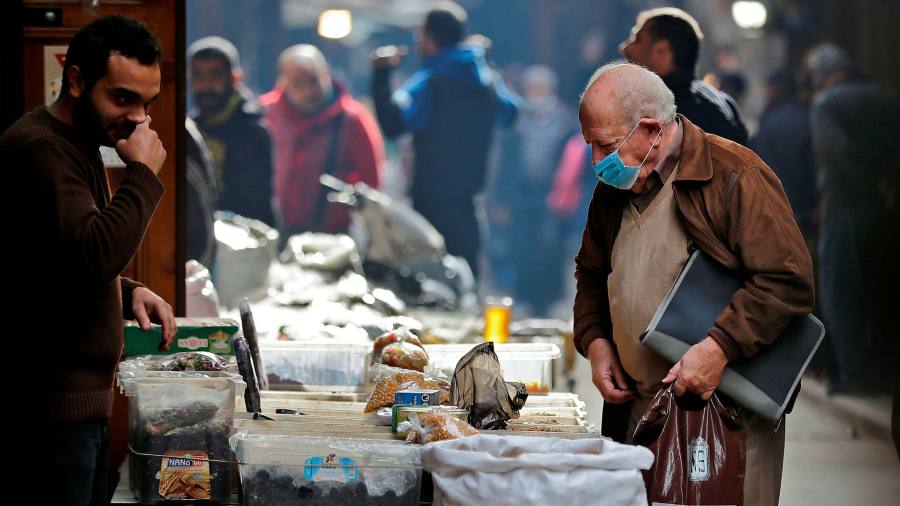[ad_1]
The street café in Lebanon’s impoverished second city Tripoli was never going to make Sameer Himaydan and his family millionaires. But today, with his sales netting daily profits of not much more than $2, it barely keeps them alive.Â
“I have to sell 70-80 cups of coffee to make 20,000 Lebanese pounds,†said the 55-year-old. That would have been worth roughly $13 two years ago, but today it amounts to $2.20 at black market rates. The sum “isn’t enough to cover my kids’ and my breakfastâ€, he said, adding that as well as his two sons, he also needed to support his parents and sister.Â
Lebanon’s financial crisis of more than a year, exacerbated by the coronavirus pandemic, has left the economy ravaged by hyperinflation, job losses and soaring poverty. A quarter of full-time private-sector jobs were lost between 2019 and 2020 and gross domestic product fell by nearly a fifth in 2020.
Meanwhile, a banking crisis has led to savers being locked out of accounts held in US dollars, and the catastrophic blast at Beirut’s port last August worsened the economic problems and led to the resignation of the government.
But in the country’s poorest neighbourhoods, the issue hurting the most is the so-called “dollar crisis†— the rapid disintegration of the Lebanese currency’s 24-year peg to the greenback.
The pound has been pegged at roughly 1,500 to the dollar since 1997. The central bank fiercely defended the peg to preserve Lebanese purchasing power and keep the price of imports down in a country that depends heavily on goods brought in from abroad, including 80 per cent of its food. But as banks’ dollar liquidity started to dry up in mid-2019, the peg began to slip. While the official rate remains, nobody but a few essential importers can get it, and last week, dollars were being sold on the black market for up to L£9,500.
Inflation is now rocketing: between December 2019 and the same month in 2020, average prices for food and non-alcoholic beverages rose 402 per cent, according to the Central Administration of Statistics.Â
The country’s leaders failed to agree the terms of a much-needed IMF bailout before the government resigned in August, and with only a caretaker administration in place, talks are on hold. The World Bank estimates that more than a fifth of the population now lives in extreme poverty.
Many worry hunger will reignite unrest in the country, where last year’s mass anti-government protests were extinguished by the pandemic.
In Tripoli, “this marginalisation that has been nurtured for decades, it’s going to boom very soonâ€, said Sarah Al Charif, a Tripoli social activist. Tensions have already begun to re-emerge: rioters torched Tripoli’s town hall during protests against Covid-19 restrictions last month.Â
In the face of the de facto currency devaluation, the central bank has protected the price of basic foods.
But imported products must be paid for with black market dollars. Meat prices have risen roughly threefold since 2019, said Muhammad Ali, a butcher in Beirut’s underprivileged Tariq el-Jedideh neighbourhood. “All meat is imported,†he said, gesturing to a chunk of beef hanging from a hook: “This is from Brazil.â€Â
“The government should figure out the dollar issue because it’s the main reason behind the crisis,†said Ali. “Before it cost L£50,000 to support a family, now you need at least L£150,000 on a daily basis.†With profits evaporating, Ali said, he has let four employees go and now works alone.
Central bank governor Riad Salame has repeatedly warned that hard currency reserves are low and that the bank will have to end subsidies. Prices have already started to rise — the government this month increased the cost of a standard pack of flatbread by 40 per cent to L£1,750.
Flatbread is the most substantial offering in Himaydan’s bare fridge in the one-room home he shares with his sons. Otherwise it contains only a few Lebanese products — potatoes, eggs, olives and half a plate of yoghurt — and some imported lentils. Coastal Tripoli is famed for seafood but Himaydan has not tasted fish since last spring during Ramadan. Even so, he is in debt to a grocery store.
“I’m worried about my young one,†said Himaydan of his 10-year-old son Yehia. Himaydan, who dropped out of school before he was Yehia’s age, said he could not afford the boy’s schoolbooks. His other son Ihab, 19, is unemployed.
Lack of work has already cost Himaydan one son. Rebels opposing the Syrian regime promised the 21-year-old $500 a month if he fought with them. Himaydan opened his phone to show the young man’s photo. He “died in Syria because there are no jobs hereâ€, Himaydan said, kissing the phone’s screen.
From his home on the roof of a rundown 10-storey building, he gazes at a nearby hill. It is topped with what looks like a castle — a local politician’s sprawling property.
“He built a mansion for himself on the top of the hill, while here we don’t have money for a piece of bread,†he said. “Lebanon should be a heaven. But because of how many politicians and deputies we have . . . our people are poor.â€
Additional reporting by Asmaa al-Omar in Istanbul
[ad_2]
Source link








